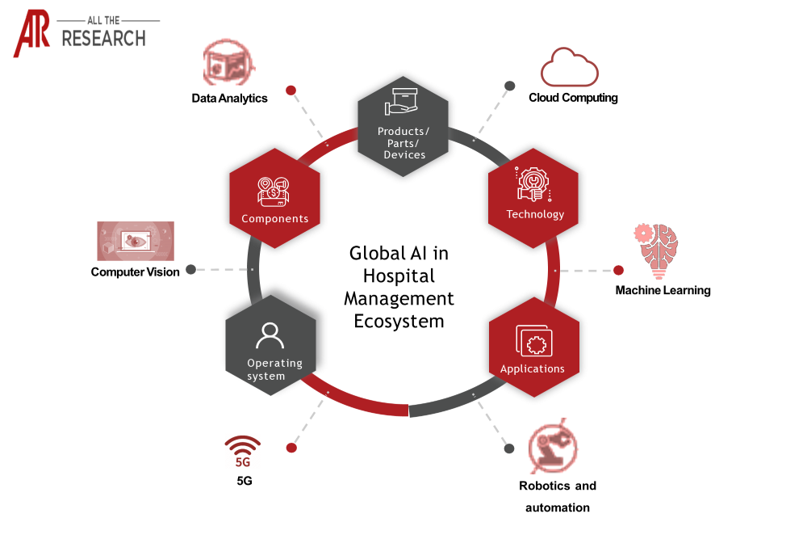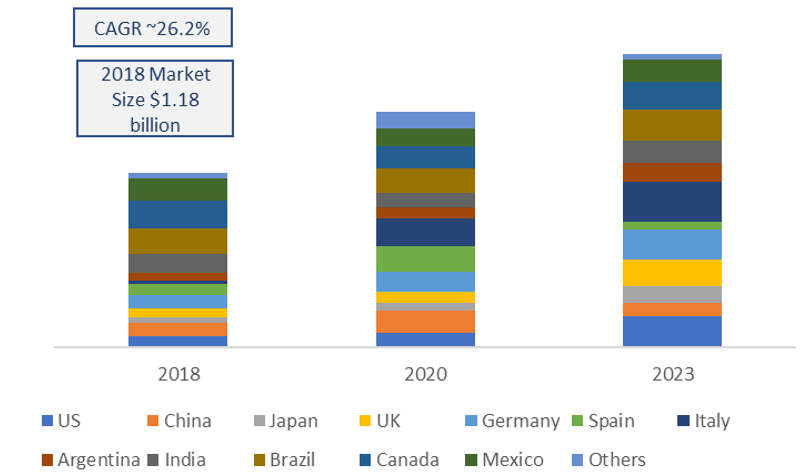The Global AI in Hospital Management Market Ecosystem was valued at US$ 1.18 billion in 2018 and will see substantial growth by USD XX.XX billion with 26.2% of CAGR by 2027.
An increase in the volume of healthcare data and the complications associated with data management demand artificial intelligence (AI). Numerous AI applications have already been employed by hospital management companies. The key categories of these applications involve diagnosis and treatment recommendations, patient engagement and adherence, and administrative activities. AI is becoming progressively more advanced at performing human activities more efficiently and quickly and at a lower cost. The potential for both AI and robotics in healthcare is vast. Just like in our everyday lives, AI and robotics are increasingly becoming a part of our healthcare ecosystem.
According to AllTheResearch, the global AI in Hospital Management Market Ecosystem was USD 1.18 billion in 2018. AI is making healthcare facilities more efficient and is improving the lives of healthcare providers and patients by automating tasks in minimal costs and time. Healthcare AI will be an area in which investments will grow rapidly. Companies such AiCure, Amara Health Analytics, and Apixio are bringing a variety of approaches to the use of AI in hospital management ecosystem. By 2025, hospital management companies will spend an average of $54 million on artificial intelligence projects. This will improve the performance of hospitals, doctors, and nurses, and will give patients a more engaged and personalized service.
AI-enabled hospital management solutions can help merge mass volumes of medical data to generate a more comprehensive view of patients. This supports healthcare providers in their decision-making, leading to better patient care and improved health of population. Artificial intelligence has played a major role in bringing about technology advancement in mechanisms through which computer algorithms work simultaneously with software to interpret conclusions, without the immediate human intervention. AI-aided devices help save crucial man-hours spent in complex operational and logistics tasks. This will improve the performance of hospitals, doctors, and nurses, and will give patients a more focused and personalized service.
Get a Sample Copy of the report at https://www.alltheresearch.com/sample-request/374

Advanced technology in healthcare is helping in managing medical records and other data in hospital management like assembling and evaluating patients’ data, stock updates, replacement requirements, etc. AI-enabled Robots help in collecting, storing, and rearranging data to provide faster, more consistent accessibility. It also helps in minimizing repetitive jobs, such as analyzing tests, X-Rays, CT scans, data entry, and other routine tasks, which can be done more rapidly and more accurately by robots. In cardiology and radiology, with the help of AI, the data would be examined according to the given instructions without any human intervention. So, cardiologists and radiologists in the future will be required to look only at the most complicated cases where human supervision is worthwhile.
Digital consultation smartphone apps like Babylon Health in the UK use AI to give medical consultation based on personal medical history and common medical knowledge. Users report their symptoms in the app, which uses speech recognition to compare against a database of illnesses. Babylon Health then offers a recommended action considering the user’s medical history. The startup Sensely has developed Molly, a digital nurse, to help people monitor a patient’s condition and follow up with treatments, between doctor visits. The program uses machine learning to support patients, focusing on chronic illnesses. The Boston Children’s Hospital in the USA has developed an application for Amazon Alexa that provides essential health information and guidance to parents of ill children. The app answers questions about medications and suggests whether the symptoms require a doctor’s visit.
|
Offering |
Technology |
Application |
End User |
|
Hardware |
Deep Learning |
Robot-assisted Surgery |
Healthcare Provider |
|
Software |
Querying Method |
Virtual Nursing Assistant |
Pharmaceutical & Biotechnology Company |
|
Service |
Natural Language Processing |
Administrative Workflow Assistance |
Patient |
|
|
Context Aware Processing |
Fraud Detection |
Payer |
|
|
Computer Vision |
Dosage Error Reduction |
|
|
|
|
Clinical Trial Participant Identifier |
|
|
|
|
Preliminary Diagnosis |
|
|
|
|
Others |
|
In 2018, North America was dominating the global market for AI in Hospital Management. Increasing implementation of healthcare IT solutions, a well-recognized healthcare sector, and the availability of funding for developing AI competencies are some of the factors that are contributing to the growth of the market in the region. The U.S. held the largest revenue share in North America and is expected to maintain its position over the forecast period. Innovations in technology and several government proposals are facilitating the adoption of digital platforms in life sciences.
The Asia Pacific is expected to develop as the fastest growing region in the coming years. Improvement in the infrastructure for healthcare IT, rising number of AI start-ups, and the increasing adoption of advanced technologies are some of the factors that are contributing to market growth. Increasing government initiatives for AI technology in this region are likely to support growth. For instance, in March 2019, in South Korea, the Ministry of Science and ICT announced that it would initiate a trial service of an AI-based precision medicine service named Dr. Answer, in December 2019.

There are many trends that are having an impact on the AI in Hospital Management market forecast. These, when evaluated from a company’s perspective, can drive growth. Our numerous consulting projects have generated sizeable synergies across all regions and all sizes of companies.
|
Company |
Ecosystem Positioning |
Total Revenue |
Industry |
Region |
|
Accenture |
Service Provider |
$39.6 Billon |
Professional services |
Global |
|
Capgemini |
Service Provider |
$14.6 Billion |
IT Services |
Global |
|
Cognizant |
Service Provider |
$16.1 Billion |
IT Services |
Global |
|
Amazon |
Product Provider |
$232.8 billion |
AI Services |
Global |
|
|
Product & service Provider |
$ 136.2 Billion |
IT Services |
Global |
Very few markets have the interconnectivity with other markets like AI. Our Interconnectivity module focuses on the key nodes of heterogenous markets in detail. Data analytics, Cloud Logistics, Machine Learning, and Computer Vision markets are some of our key researched markets.

|
Trends |
Offering |
Technology |
Application |
End User |
Technology |
Others |
|
|||||
|
AI can be integrated with Robotic Surgical Systems (RSS) and Robotic Ground Platforms (RGPs) to provide remote surgical support and evacuation activities. The US is involved in the development of RSS, RGPs, and various other systems for battlefield healthcare. Under difficult conditions, systems equipped with AI can mine soldiers' medical records and assist in complex diagnosis |
Hardware |
|
Robot-assisted Surgery |
|
|
0.72% |
||||||
|
IBM’s Watson research team has partnered with the US Veterans Administration to develop a clinical reasoning prototype, known as the Electronic Medical Record Analyzer (EMRA). This preliminary technology is designed to use machine learning techniques to process patients’ electronic medical records and automatically identify and rank their most critical health problems |
Software |
Querying Method |
|
|
|
0.37% |
||||||
|
Machine learning will find extensive usage in battlefield healthcare. The Electronic Medical Record Analyzer (EMRA) technology is designed to use machine learning techniques to process patients' electronic medical records and automatically identify and rank their most critical health problems |
|
Natural Language Processing |
Dosage Error Reduction |
|
|
0.19% |
||||||

Ask for free product review call with the author

Share your specific research requirements for a customized report

Request for due diligence and consumer centric studies

Request for study updates, segment specific and country level reports
